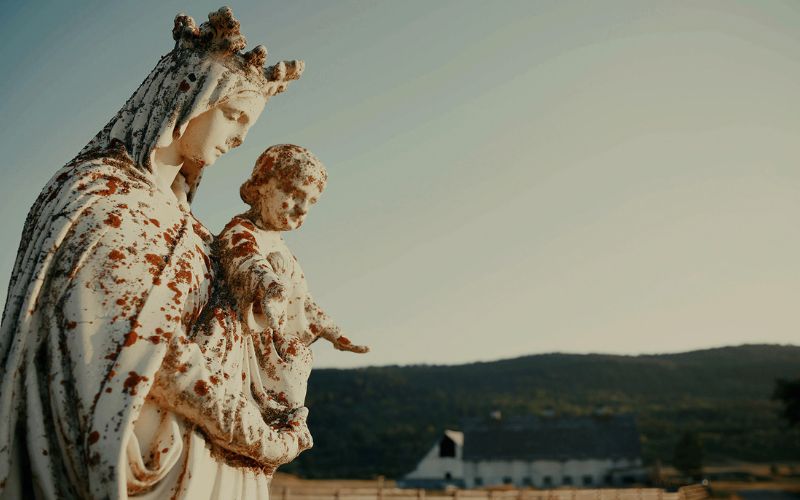
- Details
- By Jenna Kunze
Canadian residential schools have once again found themselves in Hollywood, this time as a focal documentary at the Sundance Film Festival premiere on Jan. 20 in Park City, Utah.
Filmmakers and journalists Julian Brave NoiseCat (Canim Lake Band Tsq'escen) and Emily Kassie created an investigative documentary, “Sugarcane,” which chronicles past abuses and a current search for missing children at an Indian residential school in British Columbia, nearby Sugarcane Indian Reserve.
The film examines NoiseCat’s personal connection to the school where his father was born and attended and also his communities’ movement towards reckoning and healing from intergenerational trauma stemming from residential schools. Additionally, the documentary chronicles the self-reflection of the First Nation’s former chief, Ricket Gilbert. Gilbert was part of a coalition of First Nations leaders and residential school survivors who traveled to the Vatican to meet with the Pope in 2022, after which the Pope visited Canada to apologize for the “evil” committed by so many Christians against Indigenous peoples.
“It’s an intimate and epic cinematic portrait of my people in the moment when the spirits of our missing children started to come home,” NoiseCat wrote in a Medium post ahead of the premiere.
NoiseCat wrote that Kassi, his former colleague at Huffington Post, called him in 2021 to ask him to collaborate on a documentary, after the discovery of 215 unmarked graves of Native students were found at a former residential school, Kamloops Indian Residential School, in BC.
“Two weeks later, when I called Emmy back and said I’d be open to collaborating, she told me the First Nation was the Williams Lake First Nation and the school was St. Joseph’s Mission,” NoiseCat wrote. “Of 139 Indian residential schools across Canada, Emily happened to choose the school that still looms over the life of my family, my father and myself.”
In late 2021, Williams Lake First Nation (WLFN) began conducting its own nine-month investigation into potentially unmarked graves at its former residential school, St. Joseph’s Mission.
First Nations Chief Willie Sellars announced the findings in late January 2022: the potential burial sites of at least 50 Indigenous children were found on the grounds of St. Joseph’s Mission Residential School.
St. Joseph’s Mission Residential School was open from 1891 and 1981 on land less than three miles from the Williams Lake First Nation. The school was operated by various religious sects, though it was controlled by Roman Catholic missionaries as part of the residential school system set up by the Government of Canada. It was one of an estimated 139 residential schools named by the Canadian government's Truth and Reconciliation Commission, though historians say that number doesn’t encompass the full picture.
For decades, there were reports of neglect and abuse at the St. Joseph Mission that were ignored or, in some cases, destroyed, Sellars said. Records show that, on one occasion, nine students intentionally ingested poison hemlock in an attempt to commit mass suicide to escape the school, leading to one death.
Several members of the clergy that served the St. Joseph Mission were tried and convicted of sexual crimes against children in the 1990s.
Since its premiere, "Sugarcane" has received praise from outlets including Hollywood Reporter and The Wrap and was selected as the Critic’s Pick for Indie Wire.
“Sugarcane’s sensitivity to the ongoing pain of its subjects is one of the film’s principal achievements,” Hollywood Reporter’s Lovia Gyarkye wrote. “NoiseCat and Kassie offer an affecting portrait of a community that endures in spite of colonial genocide.”
IndieWire’s Esther Zuckerman wrote that those who come to documentaries looking for resolution might be slightly disappointed with ‘Sugarcane.’
“That’s in part because so many of the victims and perpetrators are dead and in part because of how memories go suppressed or unacknowledged,” she wrote. “‘Sugarcane’ doesn’t force conclusions that aren’t there. Instead, it lets the empty parts of the saga linger so the ghosts of what transpired feel present. It means, ultimately, that ‘Sugarcane’ is something more meaningful than a mere history lesson. It’s a portrait of what remains when injustice occurs.”
More Stories Like This
Watermark Art Center to Host “Minwaajimowinan — Good Stories” ExhibitionMuseums Alaska Awards More Than $200,000 to 12 Cultural Organizations Statewide
Zuni Youth Enrichment Project Takes Top Emerging Artist Apprentices to Phoenix for Artistic Exploration and Cultural Immersion
From Dishwasher to Award-Winning Chef: Laguna Pueblo's Josh Aragon Serves Up Albuquerque's Best Green Chile Stew
Rob Reiner's Final Work as Producer Appears to Address MMIP Crisis
Help us defend tribal sovereignty.
At Native News Online, our mission is rooted in telling the stories that strengthen sovereignty and uplift Indigenous voices — not just at year’s end, but every single day.
Because of your generosity last year, we were able to keep our reporters on the ground in tribal communities, at national gatherings and in the halls of Congress — covering the issues that matter most to Indian Country: sovereignty, culture, education, health and economic opportunity.
That support sustained us through a tough year in 2025. Now, as we look to the year ahead, we need your help right now to ensure warrior journalism remains strong — reporting that defends tribal sovereignty, amplifies Native truth, and holds power accountable.
 The stakes couldn't be higher. Your support keeps Native voices heard, Native stories told and Native sovereignty defended.
The stakes couldn't be higher. Your support keeps Native voices heard, Native stories told and Native sovereignty defended.
Stand with Warrior Journalism today.
Levi Rickert (Potawatomi), Editor & Publisher


